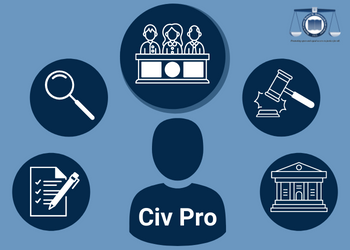This blog post was originally published on October 11, 2022 and was last updated on May 9, 2024.
At a hearing, the judge will “hear” filings for a court case. There may be multiple hearings for your case, depending on what has been filed. This post in the Civ Pro series will address questions frequently asked by pro se (self-represented) litigants about “setting” (scheduling) a hearing for their civil case. Generally, as a pro se litigant, you will be responsible for setting a hearing for your case. The court will not automatically set a hearing for you.
When can I set my hearing?
When you file the starting forms for your case, you will receive a court number from the clerk’s office along with other information about your case, including your case number. After you file your case, call the court coordinator to set a hearing date. Search online or call the clerk’s office to find the contact information for your court’s coordinator.
If your case is contested (the other party is against it), the other party needs a reasonable amount of time to respond to the case before the hearing date. Some cases allow more time for the respondent to file an answer to your petition or motion before you can set your hearing. For example, for most divorces in Texas, you must wait at least sixty (60) days from the day you file your petition before you can set your hearing.
For further information, we recommend the following articles from TexasLawHelp.org:
How to Set a Contested Final Hearing (Family Law) - Texas Law Help
How to Set an Uncontested Final Hearing (Family Law) - Texas Law Help
Do I have to notify the other party about the hearing date?
Yes. The petitioner must notify the respondent(s) of a case of any hearings that are set for the case, even if all parties agree on all the facts of the case. Do this by filing a Notice of Hearing form with the clerk’s office and serving it to the respondent(s). You can find examples of a Notice of Hearing on TexasLawHelp.org.
According to TexasLawHelp.org: “The law says you must get at least 45 days’ notice of a final hearing, at least 10 days’ notice of an enforcement hearing, and at least three days’ notice of most other hearings.”
How do I know if a hearing was set by the other party?
You should receive a Notice of Hearing from the other party at least three days before the hearing date. You may also check with the court coordinator to see if a hearing has been set. Have your case number ready and call the court coordinator to see if a hearing date has been set. If no hearing has been set yet, check to see if there are any required waiting periods for your case, and once these waiting periods have passed, check back with the court coordinator often.
What if I can’t make the hearing date or didn’t receive enough notice?
If you need more time to get ready for a hearing, you may able to ask for a continuance. If you would like to ask for a continuance, you will need to file a Motion for Continuance with the court, and if the other party does not agree with your request for a continuance, all parties may need to attend a “continuance hearing” for the judge to either approve or deny the continuance by signing an Order on Motion for Continuance. Forms for a Motion and Order for Continuance are available on TexasLawHelp.org.
If you just found out about a hearing and did not receive at least three days’ notice, it is important to still attend the hearing. You may ask for a continuance at the hearing by bringing a Motion for Continuance and Notice of Hearing form to the hearing. The judge may or may not grant the continuance and reschedule the hearing for the case for a later date by signing an Order on Motion for Continuance.
If you think you will be unable to appear at your hearing in person, you may be able to attend your hearing by telephone. It is important to request to appear by telephone ahead of time. Otherwise, the court will assume that you will attend the hearing in person.
Contact the clerk of your court for questions about attending or rescheduling your hearing. You may find contact information for your court on their website.
Can I set a hearing for my case if the respondent has been served but has not filed an answer?
In uncontested cases (cases that either can be finished by agreement or by default), you may be able to set a hearing and finish the case without the other party in attendance. This can be done by filing a Motion to Set Hearing. Review this article from TexasLawHelp.org for more information about setting and attending a hearing for an uncontested case.


